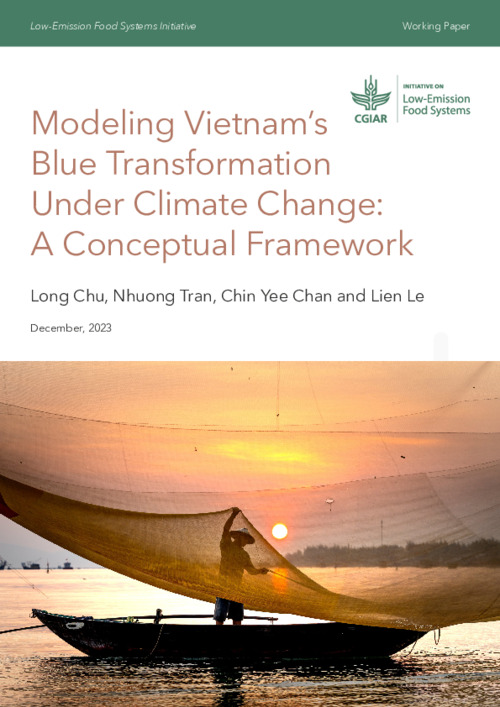Please use this identifier to cite or link to this item:
https://hdl.handle.net/20.500.12348/5739
Modeling Vietnam’s Blue Transformation Under Climate Change: A Conceptual Framework
| dc.creator | Long Chu, H. | en_US |
| dc.creator | Tran, N. | en_US |
| dc.creator | Chan, C. | en_US |
| dc.creator | Le, L. | en_US |
| dc.date.accessioned | 2024-01-04T21:14:19Z | |
| dc.date.available | 2024-01-04T21:14:19Z | |
| dc.date.issued | 2023 | en_US |
| dc.identifier.citation | Chu L, Tran N, Chan CY and Le L. 2023. Modeling Vietnam’s Blue Transformation Under Climate Change: A Conceptual Framework. Penang, Malaysia: WorldFish. Working Paper. | en_US |
| dc.identifier.uri | https://hdl.handle.net/20.500.12348/5739 | |
| dc.description.abstract | Vietnam has emerged as a global fish producer. Globally, the country is the fourth-largest producer of aquatic food, and the third-largest fish exporter in the world. Vietnam is at the frontline in meeting the global demand for aquatic foods. Aquatic food is increasingly becoming a primary source of protein and micronutrients, livelihoods, national economy, and well-being for Vietnamese. Therefore, sustainable development of the aquatic food system is critical for human, animal, and ecosystem health, including biodiversity, land and water use, climate, and other aquatic and land-based economic sectors. Nevertheless, the fish sector in Vietnam significantly contributes to greenhouse gas (GHG) emissions and mangrove deforestation. Yet, it is unclear how Vietnam’s fish sector and associated agricultural industries can respond to climatic risks and contribute to climate change mitigation despite the country’s strong commitment to net-zero emissions by 2025. Research and innovations that support sustainable decision-making should be prioritized in Vietnam. It is essential to promote science and policy research to increase Vietnam's knowledge base toward its blue transformation, especially quantitative frameworks, to support and guide decision-making processes toward its net-zero-emission commitment. This priority includes developing and adopting user-friendly integrated modeling and planning frameworks to assist stakeholders in examining the trade-offs and co-benefits of policy options in agriculture and aquaculture food systems, undertaking stock assessments as part of MRV systems (Measurement, Reporting, and Verification), developing scenarios of potential futures, and designing policies and programs. The modeling frameworks also provide practical tools to assess policy changes' socio-economic and environmental impact on desired objectives and stakeholders, including gender and regional-specific impacts. | en_US |
| dc.format | en_US | |
| dc.language | en | en_US |
| dc.publisher | WorldFish (WF) | en_US |
| dc.rights | CC-BY-NC-4.0 | en_US |
| dc.subject | vietnam | en_US |
| dc.subject | economic modeling | en_US |
| dc.title | Modeling Vietnam’s Blue Transformation Under Climate Change: A Conceptual Framework | en_US |
| dc.type | Working Paper | en_US |
| cg.contributor.funder | CGIAR Trust Fund | en_US |
| cg.coverage.country | Viet Nam | en_US |
| cg.coverage.region | South-Eastern Asia | en_US |
| cg.subject.agrovoc | aquaculture | en_US |
| cg.subject.agrovoc | fisheries | en_US |
| cg.subject.agrovoc | greenhouse gas emissions | en_US |
| cg.subject.agrovoc | fish | en_US |
| cg.contributor.affiliation | WorldFish | en_US |
| cg.contributor.affiliation | Australian National University | en_US |
| cg.contributor.affiliation | Australian National University, Crawford School of Public Policy | en_US |
| cg.identifier.status | Open access | en_US |
| cg.contribution.worldfishauthor | Tran, N. | en_US |
| cg.contribution.worldfishauthor | Chan, C. | en_US |
| cg.description.theme | Climate Change | en_US |
| cg.description.theme | Sustainable aquaculture | en_US |
| cg.creator.id | Nhuong Tran: 0000-0002-1813-4571 | en_US |
| cg.creator.id | Chin Yee Chan: 0000-0001-8615-2678 | en_US |
Files in this item
This item appears in the following Collection(s)
-
Climate Change [204]
-
Sustainable aquaculture [2717]
